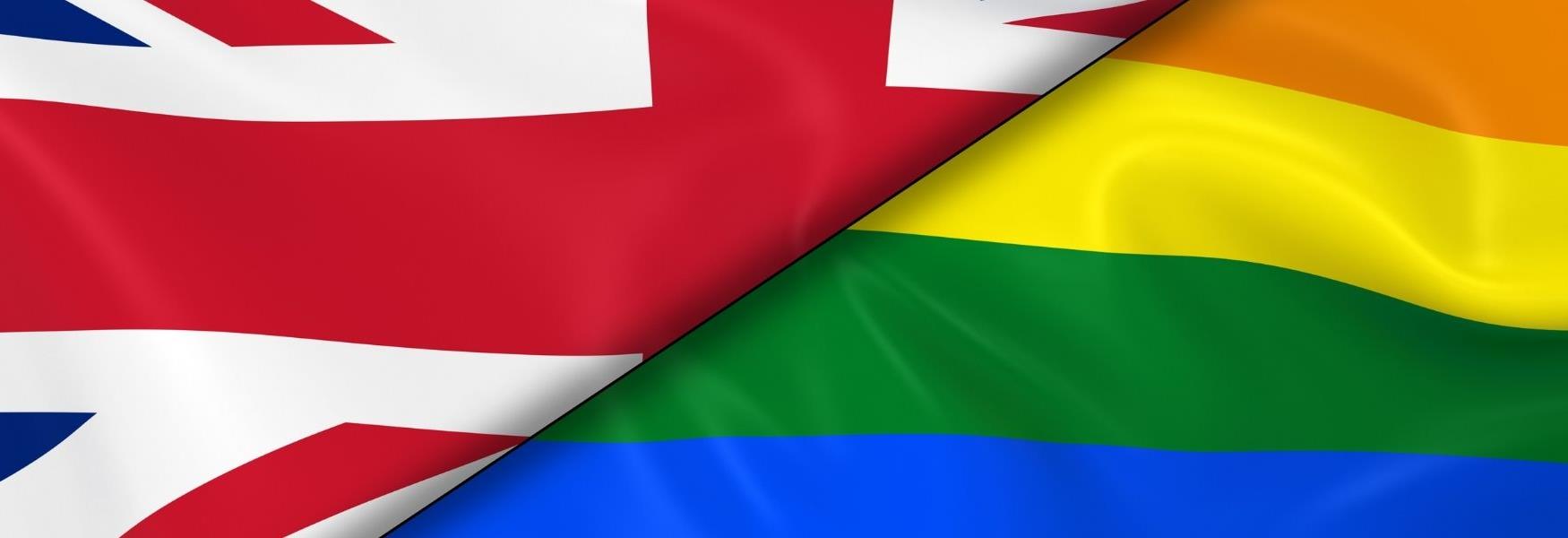To build your own Itinerary, click  to add an item to your Itinerary basket.
to add an item to your Itinerary basket.
Already saved an Itinerary?



You are here: UK History > Britain's LGBTQA+ history > Timeline of Britain's LGBTQA+ history
The LGBTQA+ (lesbian, gay, bisexual, transgender, queer, asexual and other identities) community has mostly had their history hidden in Britain and knowing about their heritage and the huge contributions they have made to society, will help us all become much more inclusive.
Members of the LGBTQA+ community have long been struggling with oppression. Fortunately, the last legal execution for being homosexual was in 1835 but that didn’t mean that people didn’t fall foul of the law. It wasn’t decriminalised until the 1960s and still today, there are people who feel oppressed and excluded because of their sexuality or gender identity.
1533: Henry VIII brings in the “Buggery Act” making sodomy illegal.
The Act did covered all genders but was used mostly against homosexual men. It was renewed three times over the next 20 years.
1828: The “Buggery Act” is repealed
It is replaced by the Offences Against the Person Act, which unlike the previous Act focused on male same sex activity. Homosexual acts were punishable by death.
1835: Last two men executed for homosexual acts in the UK
Their names were James Pratt and John Smith.
1861: Offences Against the Person Act amended
The death penalty is revoked and replaced with a prison term of hard labour which stretches between 10 years and life.
1866: Hyde v Hyde and Woodmansee
This court case about a polygamous marriage created the legal definition of marriage was between one man and one woman. Something that would have lasting implications for the next 100 or so years.
1885: The Criminal Law Amendment Act aka the Blackmailer’s Charter
Section 11 of the act was used to prosecute those who “committed acts of gross indecency with male persons”. It became known as the Blackmail’s Charter because it encouraged blackmail against men who engaged in homosexual acts. The Act also changed the terms of punishment with hard labour being reduced to two years. Oscar Wilde was convicted under the act and served two years in prison.
1921: Parliament debates making sexual acts between women illegal
MPs debated adding to the Criminal Law Amendment Bill to extend the crimes associated with homosexuality to women. Initially, the bill was intended to protect children under the age of 16 however it was finally decided that by debating the issue, it would make women aware of lesbianism.
1946: An autobiography of the first transgender man was published.
The book details the author’s journey through reassigning their gender and the surgeries they undertook by Sir Harold Gillies.
1951: The first known case of male to female sex reassignment surgery
The operation was performed on Roberta Cowell, who was assigned male at birth but had their sex legally changed and underwent surgery.
1954: The Wolfenden Committee is established
The committee was formed in response to an increase in arrests and persecutions of men following the war. Those persecuted included Alan Turing, a code breaker who helped end WWII.
1957: The Wolfenden Report is released
The report recommended the decriminalisation of same sex relationship between consenting adults over 21 in private, except in the armed forces. The report was supported by the Archbishop of Canterbury but rejected by the government.
1958: The Homosexual Law Reform Society and Albany Trust founded
Both were created to campaign for the legalisation of same sex relationships in the UK and were developed into a counselling organisation for members of the LGBTQA+ community.
1963: The UK’s first lesbian and bisexual journal published.
1964: The formation of the NWHLRC (now known as the campaign for Homosexual Equality)
1966: The formation of the Beaumont Society
A trans support group who aimed to provide better information and support for the transgender community.
1967: The Sexual Offences Act decriminalised sex between two men aged 21 and over in private.
However, this didn’t stop the wide discrimination of the LGBTQA+ community and still led to arrests.
1969: The Stonewall Riots
Though this took place in New York, it provided a catalyst for LGBTQA+ movements around the world.
1970: The London Gay Libration Front is founded
1972: The first London Pride is hosted
The event took place on the anniversary of the Stonewall Riots.
1972: The first issue of Sappho magazine published and the Gay News founded and published.
1976: Lemon v Whitehouse trial
Mary Whitehouse took Gay News to trail for blasphemy the first such case for 40 years. Gay News, represented by its founder, Denis Lemon, lost the case but legal costs were covered by donations.
1977: The first gay and lesbian Trade Union Congress takes plac
1978: The Pride flag is designed by Gilbert Baker.
1979: The Harry Benjamin International Gender Dysphoria Association (now known as the World Professional Association for Transgender Health) is founded.
The group’s aim was to provide information and understanding around gender dysphoria.
1979: BBC2 airs one of the first documentaries about transgender lives.
1980: Scotland passes the Criminal Justice Act
Sex between two men in private over the age of 21 is decriminalised in Scotland and the age of consent for gay and bisexual men is set at 18.
1981: The first UK case of HIV/AIDs
The first recorded case was of a 49 year old man who was admitted to Brompton Hospital in London. He died 10 days later.
1981: Dudgeon v the UK
Gay activist Jeff Dudgen filed a complaint with the European Commission of Human Rights after being interrogated by police in Belfast about his sexuality. The court found that Northern Ireland’s criminalisation of same-sex acts violated Article 8. It was the first case that decided in favour of LGBTQA+ rights and male homosexual acts were decriminilised in Northern Ireland by 1982.
1982: Terrence Higgins Trust founded
Named for Terrence Higgins who died of AIDS, the trust is the UK’s first AIDS charity.
1982: Black Lesbian and Gay Centre founded
1985: Men who have sex with men banned from donating blood
This was in response to the HIV/AIDs crisis of the 80s and was not lifted until 2011.
1987: AZT made available in the UK
AZT is a medication used to prevent and treat HIV/AIDS, it became available on prescription in March of that year.
1988: Section 28 introduced as part of the Local Government Act
Section 28 stated that local authorities should not intentionally promote homosexuality and was a huge step backwards for LGBTQA+ rights in the UK, resulting in huge uproar.
1988: Stonewall UK founded by Sir Ian McKellen, Lisa Power MBE and Lord Cashman CBE
The trio formed the group in response to Section 28 and today it is the largest LGBTQA+ organisation in Europe.
1990: OutRage created to combat police mistreatment of LGBTQA+ individuals
1990: Lesbian and Gay Police Association founded
It represented the needs and interests of gay and bisexual officers and staff across the UK. It ceased to exist in England and Wales in 2014 but remains active in Scotland and is funded by the Scottish Government.
1992: Homosexuality is declassified as a mental illness by the WHO
1994: The age of consent for same sex relations between men is lowered to 18
it was later lowered to 16 to be equal with the heterosexual age of consent.
1994: London Lesbian Avengers founded
The group invaded the Victoria Monument and campaigned in support of Sandi Toksvig, who was dropped as a presenter of a Save the Children charity event after revealing her sexuality.
1995: Mermaids founded
Mermaids is a trans children support group which aims to help trans and gender diverse children, young people and their families.
1998: The Bolton Seven case
The Bolton Seven were a group of gay and bisexual men who were convicted of gross indecency. They were convicted under section 13, which stated that more than two men having sex together was illegal. None of the men received custodial sentences and OutRage campaigned on their behalf.
2000: The UK government lifts ban allowing lesbian, gay and bisexual people serving in the army.
2000: Scottish Government abolishes Section 28 of the Local Government Act
2001: Age of consent for gay/bi men lowered to 16.
2002: Same sex couples receive equal adoption rights as heterosexual couples
2003: Section 28 repealed in England, Wales and Northern Ireland.
2003: Employment Equality Regulations
Employers are no longer able to discriminate against LGBTQA+ people based on their sexual orientation or gender identity. Previously, there was no protection from bullying or discrimination in the workplace.
2004: The Gender Recognition Act passed.
The Act allows transgender people to identify fully and legally with their chosen gender and receive ID to that effect.
2004: Civil Partnership Act introduced
This act gave same sex couples the same rights and responsibilities as married heterosexual couples in England, Scotland, Wales and Northern Ireland.
2008: The Human Fertilisation and Embryology Act introduced
2010: The Equality Acy introduced
The Act legislates for equal treatment regardless of age, disability, gender, marriage, race, religion, sex and sexual orientation. However it did have allow religious groups to refuse same sex marriages if it went against their beliefs. The Equality Act 2010 was not fully introduced into Northern Ireland.
2011: The lifetime ban on men who have sex with men donating blood is lifted in the UK, apart from Northern Ireland. It is amended to being a 1 year ban.
2013: Stonewall UK launches: Gay. Let’s Get Over It campaign in schools.
2013: The first Trans Pride takes place
It was held in Brighton and was the first of its kind in Europe. London’s first Trans Pride march took place in 2019.
2013: Alan Turing receives posthumous royal pardon
Alan Turing broke the German Enigma code and was chemically castrated after his sexual orientation was revealed, despite his contributions to the war effort. He was granted a royal pardon posthumously.
2014: The Marriage Act comes into effect in England, Scotland and Wales
This allowed same sex marriage legal.
2016: Prince William features on the cover of Attitude magazine
Prince William invited Attitude Magazine to Kensington Palace alongside members of the LGBTQA+ community to hear their experiences of homophobia, biphobia and transphobia and discuss the effect on their mental health. He is the first royal to have been photographed for a gay publication.
2017: Children and Social Work Bill is amended to make relationship and sex education mandatory in schools in England. It is extended to Wales in 2019.
2017: The 1 year ban on men who have sex with men donating blood is changed to a 3 month ban. It remains 1 year in Northern Ireland.
2017: The Alan Turing Law introduced
AKA the Policing and Crime Act which pardoned all historic instances of criminal convictions of gross indecency against men. It only applies to convictions in England and Wales.
2019: Transgender health issues declassified as a mental illness by WHO
2019: Same sex marriage legalised in Northern Ireland.
© Visit Heritage 2025. All Rights Reserved

.png)


